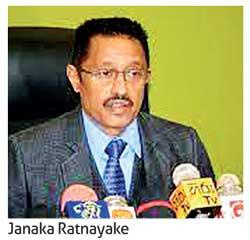28 Jun 2022 - {{hitsCtrl.values.hits}}
By Nishel Fernando
As a partial solution to find the required foreign currency to maintain power generation at the Norochcholai coal power plant, the Public Utilities Commission of Sri Lanka (PUCSL) is asking all exporters, including services exporters, to settle their monthly electricity bills in US dollars.
 In its counter proposal to the electricity tariff revision requested by the Ceylon Electricity Board (CEB), the PUCSL has proposed a condition requiring all exporters to pay their monthly electricity bills in US dollars.
In its counter proposal to the electricity tariff revision requested by the Ceylon Electricity Board (CEB), the PUCSL has proposed a condition requiring all exporters to pay their monthly electricity bills in US dollars.
“All customers, who earn more than 60 percent of their revenue in US dollars, would be required to settle their monthly electricity bills issued by the CEB/LECO in US dollars, calculated at the US dollar exchange rate (buying rate declared by the Central Bank of Sri Lanka) at the time of settling the bill,” PUCSL Chairman Janaka Ratnayake told reporters in Colombo yesterday. Accordingly, manufacturing establishments, marine and airline service providers, export-oriented IT or other service companies, non-resident visa holders and diplomatic missions/residences and the Sri Lanka Tourism Development Authority-registered tourist establishments that primarily serve foreign tourists, will fall under this category.
Ratnayake noted that a mechanism would be introduced with the assistance of the Finance Ministry and Central Bank for exporters to settle their monthly electricity bills in US dollars.
With power cuts are likely to continue into next year, as the government struggles to find the necessary foreign exchange to import fuel to run the thermal power plants, he stressed that US dollar revenue would bring some stability to power generation, in order to maintain power cuts at current levels.
In particular, he highlighted that if the government fails to import the required coal to power the Norochcholai coal power plant, it would result in a highly unstable power supply after September this year.
“The electricity supply would become highly vulnerable, if we fail to sustain power generation at the Norochcholai coal power plant. This is where we receive the base power to our grid. We need US $ 4-5 million to import several spare parts for the plant. More critically, we need around US $ 610 million to import coal to maintain power generation at the Norochcholai plant after September 15, until April next year,” he elaborated.
The proposed US dollar revenue for the CEB is aimed at partially financing the forex requirements to import coal for the next six months. In the first four months of this year, Sri Lanka imported US $ 256 million worth of coal. According to the proposed electricity tariff revision, industrial consumers, hotels, government agencies and places of worship would see their unit price (Rs/kwh) increasing by 61 percent, 43 percent, 43 percent and 183 percent, respectively.
Despite the proposed steep increase, places of worship would still enjoy the lowest unit cost at Rs.21.46 per unit, irrelevant of their electricity consumption.
However, the PUCSL noted that it has recommended to the government to provide a subsidy of Rs.65 billion for household electricity consumers, based on their monthly consumption up to 60 units.
According to the CEB’s original proposal, the average monthly bill for those who consume less than 30 units was expected to increase by 835 percent to Rs.507.65 while the households that consume more than 30 units and less than 60 units were expected to increase by 673 percent to Rs.1488. If the proposed subsidy is approved, the PUCSL noted that the average monthly electricity bill for consumers below 30 units can be maintained at Rs.227 and the average monthly electricity bill for consumers using more than 30 units and less than 60 units can be maintained at Rs.658.
23 Nov 2024 23 Nov 2024
23 Nov 2024 23 Nov 2024
23 Nov 2024 23 Nov 2024
23 Nov 2024 23 Nov 2024
23 Nov 2024 23 Nov 2024